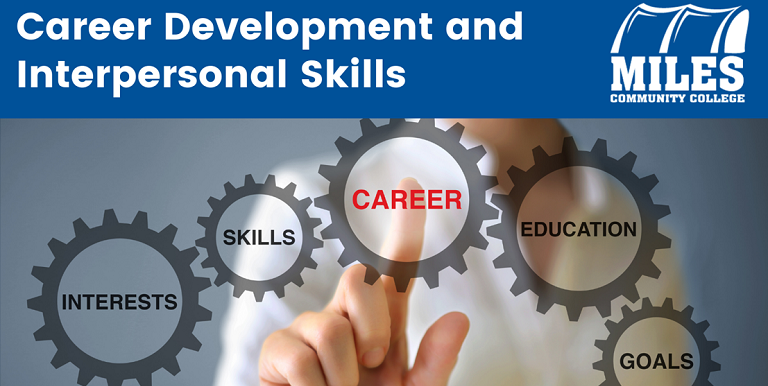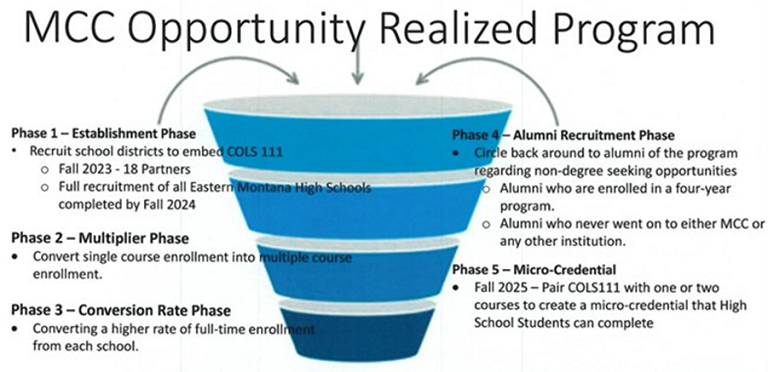The Miles Community College Opportunity Realized Program

Career development programs provide students with valuable skills required in today's job market. Technical proficiency alone is no longer sufficient; employers now prioritize strong interpersonal skills, effective communication, collaboration, and meaningful connections. In response to these demands, Miles Community College (MCC) introduced the Opportunity Realized Program in fall 2022, targeting high school students across eastern Montana. This program equips students with critical social and emotional competencies, bridging the gap between their aspirations and employer expectations and offering hope for rewarding careers.
Background
In 2016, the Montana Chamber of Commerce initiated a strategic plan to enhance workforce readiness by engaging schools and students to meet the needs of a growing economy. The Envision 2026 Halftime Report (Montana Chamber of Commerce, 2021) revealed that 69 percent of employers and business leaders surveyed believed that Montana's schools were not adequately preparing students for the workforce. Additionally, over three-fourths of respondents felt that workforce-readiness skills needed to be integrated into college curriculum and that career counseling required strengthening. To address these concerns at the higher education level, the report notes that,
The Montana Chamber is working with individual colleges and the Office of the Commissioner of Higher Education to incorporate employability skills, education, and basic business economics into all curricula. We will increase focus on teamwork skills, critical thinking, problem-solving, personal responsibility, and building realistic expectations of the workplace (Montana Chamber of Commerce, 2021, p. 15).
The Chamber’s plan created a call to action for education sectors throughout Montana to assist in addressing the worker and business needs of the state. MCC recognized the call and is leveraging its connections in Eastern Montana to implement a career curriculum across 41 regional high schools. These dual enrollment programs help provide much needed enrollment, which assists with the funding needs of the college. With nearly 44 percent of its headcount being dual-enrolled students, the college knew it had collaborations to benefit a career development roll-out within the schools. MCC also believed it could develop better pathways for high school students to attend college. Montana ranks in the lowest 15 percent for U.S. state college-going rates of high school graduates. The National Center for Higher Education Management System (2018) reports that only 53.97 percent of Montana high school graduates go on to college directly from high school, compared to the national average of 63.65 percent.
In 2023, the Montana State Legislature redesigned the factors for community college funding to include weighted increases for full-time enrollment in career and technical education (CTE) programs. The state has prioritized career development and workforce readiness initiatives by investing in these programs.
The Program
Following the Montana Chamber of Commerce’s report, MCC’s leadership initiated discussions to strengthen the college’s role in workforce development. The Vice President of Academic Affairs, Dean of Enrollment Management and Educational Support Services, and Dean of Student Engagement met to identify action steps to strengthen its position in workforce preparation. These campus leaders had read Answering Why: Unleashing Passion, Purpose, and Performance in Younger Generations, by Mark C. Perna, and could corroborate the ideas espoused in the book about the country’s expanding skills gap and increasing college debt. Perna (2018) writes,
We face a national epidemic of rising college costs, decreasing degree-requiring jobs, and employer frustration with the younger generations in the workplace. Yet we continue to rely on an outdated educational and workforce training system that was developed 50 years ago. (p. 7)
The leaders identified the need for a career services center, improved high school partnerships, and a course focused on interpersonal skills to complement the technical education already being taught.
The Center
After researching career programs in community colleges, the Dean of Student Engagement developed a system in which students can work with a counselor who helps them explore personal interests and how they might connect with a program of study, assists them with writing resumes and cover letters, and provides them with opportunities to practice their interviewing skills. The college partnered with Campus Compact Montana in fall 2022 to fund an AmeriCorps College Coach position to provide these resources. The Coach developed multiple resources for high school students, including a semester newsletter; outreach programming; and one-on-one counseling to learn about resume writing, interviewing, networking, and career development. The Coach utilizes the Montana Career Information System to assist students with self-surveys, career cluster inventories, and career planning. Finally, the Career Coach has helped to promote a web program created by the University of Tennessee Knoxville titled “What Can I Do With This Major?” This resource links college majors with career paths, provides links for occupational outlook information, and helps students with resources for job searches. As part of the funding for this position, the college also provides small group interactions about career goals to MCC and regional high school students, and focuses on strengthening the pathways to college for low-income and first-generation college students, while also mentoring younger students through career exploration and going to college.
Increasing High School Participation
The Montana University System developed the One-Two-Free enrollment program in 2018 to increase high school students’ access to higher education. This program offers two free dual enrollment courses of up to six credits for students in Montana high schools. Because MCC is not part of the Montana University System, it also developed the Free 2 Explore Program, which offers all eligible Montana high school students two free dual enrollment courses at the college. This program allows students to explore college majors and access other resources, such as the career services center on campus. The Dean of Enrollment Management and Educational Support Services oversees this program and works directly with high school counselors to enroll students in dual enrollment classes.
In fall 2023, the Dean extended the program by allowing high school partners to add a free career services course to help promote career readiness skills. The Dean of Student Engagement worked with the Vice President of Academic Affairs to approve the development of the College Studies 111: Career Development and Interpersonal Skills class. The Montana University System approved the course in the summer of 2022, and instruction began in fall 2022. The one-credit online course was designed to prepare students to perform effectively in the job market by developing the interpersonal and transferable noncognitive skills needed to be successful in various career fields. Topics include career exploration, career action planning, emotional intelligence, effective communication, conflict resolution, teamwork, and professionalism. The course has been incorporated into programs of study for the college’s CTE programs. The syllabus identifies several course objectives, including that students will:
- Understand and demonstrate the interpersonal attributes employers seek from successful workplace employees;
- Create a working resume, cover letter, and career action plan;
- Discern best interview practices and techniques; and
- Identify characteristics of emotional intelligence that allow them to manage their emotions and recognize and influence the emotions of those around them.
MCC worked with the individual high schools on how to incorporate the course into their curricula. For example, one of the school districts offers the course as part of CTE teachers’ curriculum; for one hour each week in the high school classes, students complete assignments for the COLS 111 course. Another district offers the course twice a week for eight weeks as a prerequisite to being placed in a job as part of the high school’s workforce pathway program.

Marketing of the Course
MCC’s president has been very active in promoting the course throughout the region and the state. Not only has he attended group meetings of the region’s superintendents, but he also has one-on-one conversations with them about the benefits of the course, connecting the class with the Montana State Office of Public Instruction’s CTE requirements. He has also secured nearly $150,000 from public and private donors to offset the cost of textbooks for the course and the general cost of instruction. Additionally, he has met with business leaders to gain their support for the program. Finally, he has actively promoted the program’s intent with state and local leaders. The college has secured 18 high school partners within the first full year of program development.
Next Steps
In September 2023, the Montana Office of Public Instruction announced plans to incorporate college and career readiness into the state’s education performance standards. Because of this, MCC is actively engaging high schools more quickly with the opportunity to adopt the Opportunity Realized Program with little impact on the high school’s teaching or administrative load.
MCC has identified five phases of the Opportunity Realized Program. Now that it has established the program and recruited 18 partner schools, the college hopes to recruit all Eastern Montana High Schools by fall 2024. Phase Two of the plan includes converting the high school students participating in COLS 111 to multiple course enrollment. By doing this, the college hopes to increase the rate of full-time enrollment from each participating high school in Phase Three. In Phase Four, MCC hopes to connect with program alumni regarding other non-degree seeking opportunities for students who may have completed a four-year degree or who have taken the course but have not yet gone to college. As a final step, the college hopes to pair the course with one or two additional classes to create a micro-credential for high school students. This final phase helps with one of MCC’s strategic goals of providing lifelong learning for high school students who do not plan to continue college (R. Slinger, personal communication, September 27, 2023).
Realizing an Opportunity for Eastern Montana
MCC’s Opportunity Realized Program represents a significant and timely response to the evolving needs of the modern job market. As the business landscape continues to emphasize technical proficiency, soft skills, and interpersonal competencies, the program provides hope and opportunity for high school students in eastern Montana.
The early successes, including 18 partner schools and significant financial support, demonstrate the program’s effectiveness and potential to transform eastern Montana’s educational landscape. As the Montana Office of Public Instruction integrates college and career readiness into the student education standards, the Opportunity Realized Program is well-positioned to further expand its reach and impact.
MCC’s Opportunity Realized Program exemplifies adaptability and responsiveness in a rapidly changing job market. It offers a clear pathway to success for high school students and contributes to building a skilled and capable workforce that will drive the economic growth of Montana. This program is a model for educational institutions seeking to empower students with the skills and knowledge they need to thrive in the 21st century workforce.
References
Montana Chamber of Commerce. (2021, November 22). Envision 2026 halftime report-2016-2021. https://issuu.com/edgemarketing/docs/montanachamber_envisionhalftimereport_web_final1
National Center for Higher Education Management Systems. (2018). College participation rates: College-going rates of high school graduates - directly from high school. NCHEMS Information Center for Education Policymaking and Analysis. http://www.higheredinfo.org/dbrowser/?year=2018&level=nation&mode=data&state=&submeasure=63
Perna, M. (2018). Answering why: Unleashing passion, purpose, and performance in younger generations. Greenleaf Book Group Press.
Richard DeShields is Dean, Student Engagement, at Miles Community College in Miles City, Montana, and a current student in the Ferris State University Doctorate in Community College Leadership program.
Opinions expressed in Innovation Showcase are those of the author(s) and do not necessarily reflect those of the League for Innovation in the Community College.










